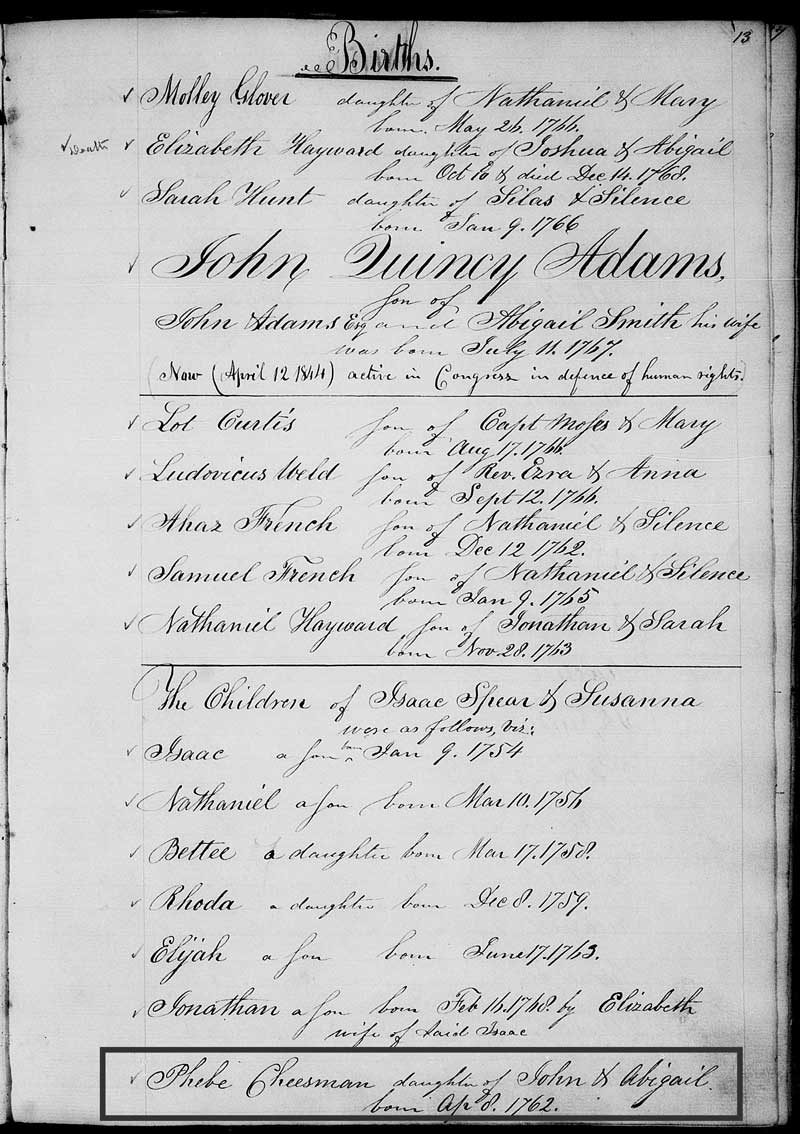This month is the 250th birthday of John Quincy Adams, as Danielle Cournoyer reminds us on the Vita Brevis blog. This reminds me of my own little JQA story, from a few years ago, a timely illustration of some of the “gotchas” you can face when using transcriptions.
I was researching a line in my family tree which lead me to the Chessman/Cheesman family of Braintree, Massachusetts. I had some initial information from a compiled genealogy and wanted to verify the information I found there in the original records.
So, I loaded FamilySearch.org, went to their Massachusetts, Town Clerk, Vital and Town Records, 1626-2001 collection and eventually found what I was looking for on page 13 of the item FamilySearch catalogs under Braintree as, “Births, marriages, deaths 1755-1810” (with a box drawn over the image to point it out):

Ah, Phebe Chesssman, I’ve found your birth, the original record, so I’m done now.
But wait, something is not quite right. Look at that entry further up the page, the one with the royal treatment:
John Quincy Adams,
son of
John Adams Esq and Abigail Smith his wife
was born July 11, 1767.
(Now (April 12 1844) active in Congress in defence of human rights.)
So what do we have here? Something is not quite right. Flipping back (digitally) to the title page of the book reveals that the entire book is a transcription, authorized by the town, and completed in 1845. It is not an original record. (The handwriting might have been another clue that this was not written in 1767.)

If that is not the original record, then what is? Going back to FamilySearch, in the same collection, is another digitized item, with a similar name, “Births, marriages, deaths 1761-1802 vol 2.” with the corresponding information on page 15, sixth entry from the bottom:

John Quincy Adams Son of John Adams Esqr & Abigail his wife was born July 11th 1767.
Notice the differences?
A critical one is that the original does not give Abigail’s surname. However, in the 19th century transcription the transcribers silently added “Smith.” This does not mean the transcribers were factually incorrect. But it does indicate, at least for this entry, that what they produced was not a literal transcription, but something that synthesized information from multiple sources, including what to them might have seemed “general knowledge,” at least in Braintree.
The lesson here? Just because something has old handwriting doesn’t mean it is an original record. Understand fully what you have in front of you, and always ask yourself whether this is a copy of something else, where that more original document might still exist. In some cases, due to accidents of man and nature, the originals no longer exist and all we have is transcription made at a later time. But in this case, for Braintree, Massachusetts, we are fortunate to have the earlier record book as well.
